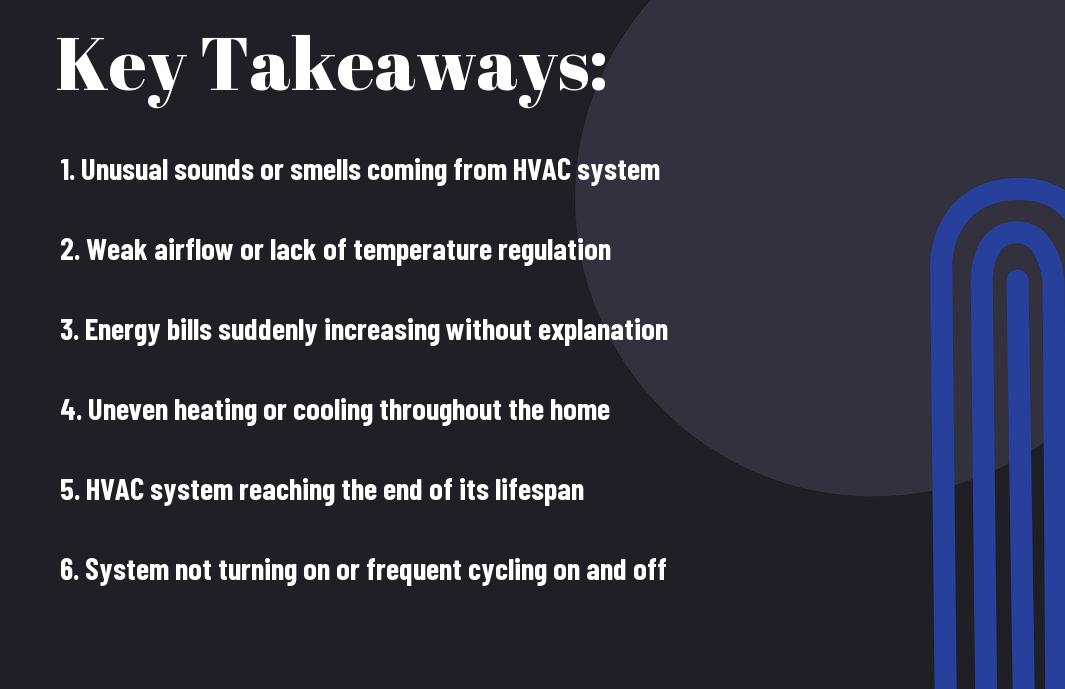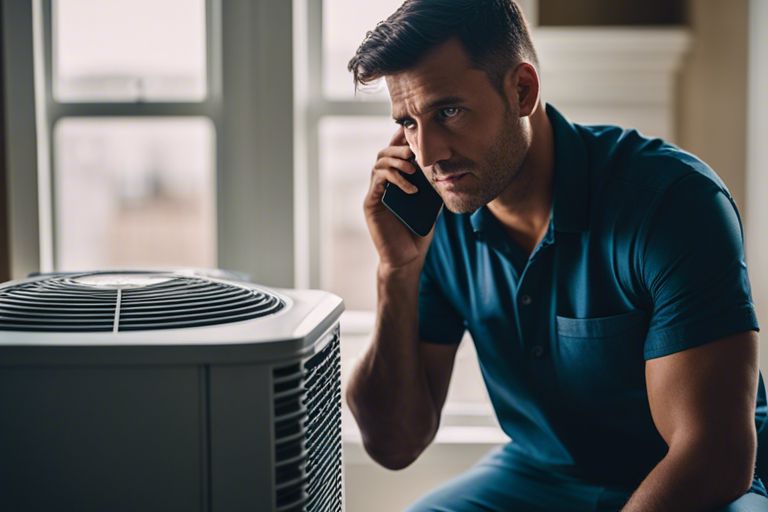There’s a fine line between ignoring a small issue with your HVAC system and waiting for a full-blown meltdown. In home disasters, a broken heating or cooling system ranks pretty high up there – right next to the alien invasion or zombie apocalypse. So, let’s chat about when it’s time to pick up the phone and call your friendly neighborhood HVAC repair team before things go from chilly to downright chilling in your living room.
Key Takeaways:
- Strange Noises: If your HVAC system is making unusual sounds like squealing, banging, or rattling, it’s time to call for repair before it turns into a horror movie soundtrack.
- Weird Smells: Don’t ignore strange odors coming from your HVAC system – that funky smell might not be your teenage son’s gym socks but a sign of a serious issue that needs professional attention.
- Inconsistent Temperatures: If your home feels like a scene from a Stephen King novel where one room is freezing while another is sweltering, your HVAC system may be haunted by a malfunction and requires immediate assistance.
- Skyrocketing Energy Bills: If your energy bills are climbing faster than the tension in a King novel, your HVAC system might be working inefficiently, signaling a need for repair to prevent a financial horror story.
- Ancient System: If your HVAC system is older than your favorite tattered copy of a King novel, it’s probably time to consider repairs or replacement before it turns into a true horror tale of breakdowns and costly emergency fixes.
Red Flags
While there are many signs that your HVAC system may need repair, some are more urgent than others. It’s imperative to pay attention to these red flags to prevent any major issues down the road.
Unusual Noises and Smells
With unusual noises like banging, squealing, or grinding, or strange smells like musty or burning odors coming from your HVAC system, it’s time to call for repair. These signs could indicate serious issues that need immediate attention.
Temperature Fluctuations
The Temperature Fluctuations table below illustrates the potential causes and solutions for temperature fluctuations in your HVAC system.
| Potential Causes | Solutions |
| Faulty thermostat | Calibrate or replace the thermostat |
| Dirty air filter | Replace the air filter |
| Blocked or leaking ducts | Inspect and repair ductwork |
The temperature in your home should remain consistent when your HVAC system is running correctly. If you notice frequent fluctuations in temperature, it’s a sign that something is amiss and needs to be addressed promptly.

Performance Issues
Reduced Airflow and Weak Cooling
Even the best HVAC systems can run into problems. One common issue is reduced airflow and weak cooling. If you notice that some rooms are warmer than others or that the air coming out of your vents isn’t as cold as it used to be, it could be a sign that your HVAC system needs attention.
Increased Energy Bills
Bills, bills, bills. We all dread seeing those numbers go up, but if your energy bills are skyrocketing and you haven’t changed your usage habits, your HVAC system could be to blame. This spike in energy consumption is often a sign that your system is working harder than it should be, leading to inefficient operation and higher costs.
This could be caused by a variety of issues, such as dirty filters, leaky ducts, or a malfunctioning thermostat. It’s imperative to address these problems promptly to prevent further damage to your HVAC system and your wallet.

Emergency Situations
Carbon Monoxide Leaks
Not all HVAC issues can wait for a convenient appointment. If you suspect a carbon monoxide leak, do not hesitate to call for emergency HVAC repair. Carbon monoxide is a dangerous gas that is odorless and colorless, making it impossible to detect without proper equipment. Symptoms of carbon monoxide poisoning can range from headaches and dizziness to more severe cases of unconsciousness or even death. Your safety should never be compromised.
Water Damage and Leaks
An unexpected water leak or visible water damage around your HVAC system should also be considered an emergency. Water can cause extensive damage to your home, including mold growth and structural issues. An immediate response to these situations is crucial to prevent further damage and additional repair costs.
Emergency HVAC situations like carbon monoxide leaks and water damage require prompt attention to ensure the safety of you and your family, as well as to prevent further damage to your home. Don’t delay – call for emergency HVAC repair services as soon as you notice any signs of these issues.
Final Words
With these considerations in mind, don’t wait until your house feels like the Arctic tundra or the Sahara desert to call your HVAC repair. Stay ahead of the game, be proactive, and give them a ring at the first sign of trouble. Your comfort and sanity are at stake here, and you don’t want to find yourself stuck in a horror story of extreme temperatures without a solution in sight. Stay cool, stay warm, and keep that HVAC number on speed dial!


Recent Comments